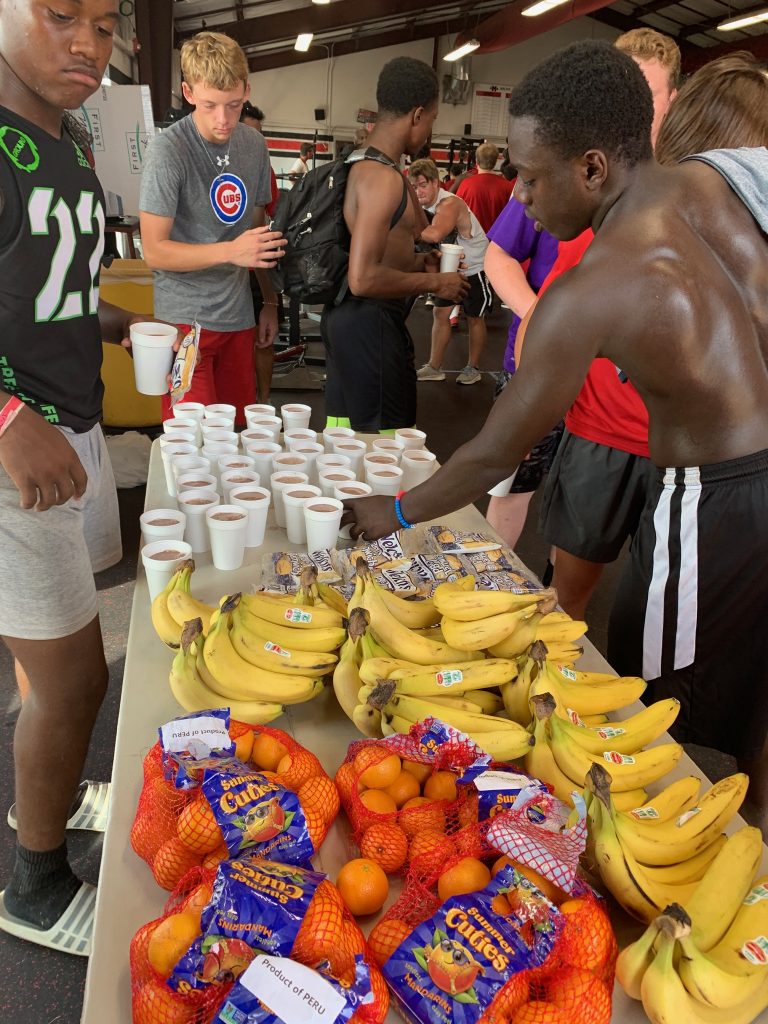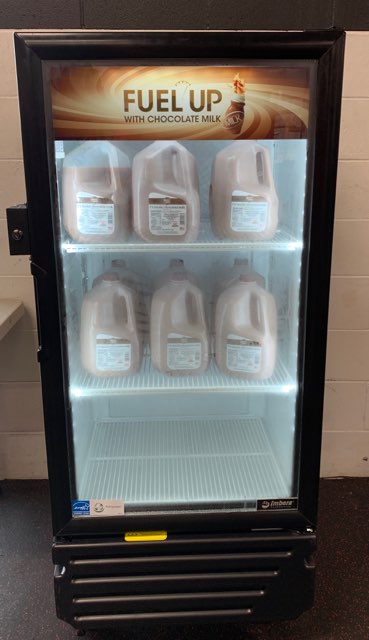Not every football loss lies within the x’s and o’s, and this case is true for the Morgan County football team.
Morgan County lost to Lovett High School 40-7 in the first round of the Georgia High School Association playoffs on Nov. 9, 2018. It was a long night that defensive coordinator Brett Bell anticipated before the first snap of the game.
“I started looking at our kids during pregame warmups and thought it might be a pretty tough night for us,” Bell said. “Everyone on Lovett’s side looked bigger, healthier, thicker, more muscular and had more definition.”
As soon as the contest concluded, Bell approached athletic director Doug Connelly with a solution to the problem.
“I told our athletic director after the game, ‘We have got to start giving our kids more nutrition,’” Bell said.
Why It’s Newsworthy: The Morgan County football team began its season on Aug. 28 and is currently 3-1 on the season.

After three months and nine days of meetings and planning, the Morgan County football team announced the implementation of the “Feed the Bulldog” program, which focuses on the importance of high school football players eating enough throughout the day to be ready for practices and games.
The program provides Morgan County football players with breakfast and lunch meals, and a pre-practice snack Monday through Friday. On game days, specifically, the players receive a pre-game meal before they warm up. Bell monitors and maintains each player’s meal based on the player’s individual goal and current size.
Area for Growth
In the future, “Feed the Bulldog” wants to provide post-practice / post-game meals, too. The coaches believe that early in the morning and at lunch, the players are receiving plenty of nutrients to load up on. But, immediately following a practice or game, the players don’t directly receive anything other than milk and water. The program hopes to solve this and have more post-practice/game meals and snacks in the near future.
“I just don’t feel like the players are receiving enough recovery from each two-hour practice,” Bell said.
Morgan County coaches identified this issue early in spring practice back in April. So the coaches held a team meeting. During this team meeting, the players received their own individual nutrition guide to take home with them. In that guide, it states “athletes who do not recover are 30 percent more likely to get injured.”
The guide also includes research supporting the program’s importance, sample meals to fix while at home and the number of nutrients an athlete should take on a daily basis.
Nutritional Programs in College
The Morgan County coaches saw this firsthand at the next level of competition.
Players like Jordan Huff and M.J. Webb, who graduated from Morgan County in 2016 and 2018 respectively, were recruited by Power-5 college football programs. Huff is currently enrolled at Georgia Tech and Webb is at the University of South Carolina. The coaches were with Huff and Webb on every college visit. Bell remembered one common trend among all Power-5 schools they visited: they all had nutritional programs for their student-athletes.
Bell admired what he saw at those colleges and incorporated some of their ideas into “Feed the Bulldog.”
Sponsorships and Funding
As soon as the high school administration approved the “Feed the Bulldog” request by the football team, he submitted a grant request to The Dairy Alliance, a corporation that focuses on dairy and healthy nutrition. Morgan County requested a coach’s cooler to store dairy products. The coach’s cooler request was granted, which saved them approximately $3,000.
The coaches had a specific plan for the cooler.
“We wanted to store chocolate milk in the cooler,” Bell said. “We saw where a lot of professional athletes like Kobe Bryant were popular for drinking chocolate milk.”

The Morgan County coaches saw chocolate milk being used at the college level, too, and wanted to add it to “Feed the Bulldog.”
Once the cooler was installed, the team needed milk to stock it. Because Morgan County has six local dairy farms, the team asked for a milk sponsorship. After the coaches wrote a handwritten letter to each dairy farm, they sponsored enough milk to last from February to August of 2019.
The dairy farms helped supply white, chocolate, and lactose-free milk for the program to begin.
The effective use of milk donations sparked another idea from Bell: asking other local businesses to donate, too.
“This part included a lot of door-to-door,” Bell said. “But we didn’t just ask for monetary donations. We also asked if businesses could donate any specific products they had.”
The players received a special treat from a local restaurant, Crowe’s Barbeque. Crowe’s sponsored an entire meal for each player that came with two barbecue sandwiches, a side and a drink.
Morgan County also received miscellaneous donations such as ground beef from cattle farmers, biscuits from Krystal, paper products from The ChopHouse Grille and assorted fruits from parents.
The coaches received monetary donations, but they promised in their letters to local businesses to spend money on chocolate milk, breakfast and lunch items and pre-practice snacks.
Senior middle linebacker Cole Freeman said that he’s very appreciative of the donations made to the program to help the team.
“Our Morgan County community really kicked this program off for us,” Freeman said. “Now, we owe it to them to continue to get better and prove the program’s worth.”
Potential Problems
Morgan County had already received $8,000-9,000 worth of donations by Aug. 28, but herein lies an issue for “Feed the Bulldog.”
My biggest concern is what’s going to happen when we start getting low on donations,” Bell said. “I’m thinking one of two things. One, we’re going to have to repitch the program to existing donors. Or two, we’re going to have to find new donors.”
Because the program mainly runs on donations and not taxpayers’ money, the uncertainty limits what “Feed the Bulldogs” can accomplish.
In two or three years, Morgan County wants to see this program benefit all athletics teams. However, if there aren’t adequate amounts of donations made, that dream may not become a reality.
“For colleges, they designate existing funds to fund their nutritional program,” Bell said. “For us, we have to go out and get it, and that makes it difficult.”
The Program’s Effectiveness
 Though “Feed the Bulldog” has been around now for seven months, senior defensive end Chris Walls felt the benefits of the program very early.
Though “Feed the Bulldog” has been around now for seven months, senior defensive end Chris Walls felt the benefits of the program very early.
“I felt better, stronger and healthier after only two or three weeks into the program,” Walls said.
Based on Bell’s data collection, Walls is among the 17 players who have gained over 10 pounds of muscle and is one of five players who gained 5.00 on the strength index, too. The strength index is based on total maxes during weightlifting versus body weight.
Morgan County coaches and players know the program isn’t perfect, but they view it as a step in the right direction. Their goal for the 2019 season is to make it past the first round of the playoffs, and they believe they have a better chance all thanks to “Feed the Bulldog.”
One thing that Bell harped on that helped give the initiative a successful start is personal interaction.
“Obviously, in today’s world, it’s easier to text,” Bell said. “Having a face-to-face meeting with people asking them for donations shows them you care and sending ‘thank you’ notes, too. I believe by all the coaches and players going above and beyond to show our appreciation has made all the difference.”
Phillip B. Hubbard is a senior majoring in journalism and in the sports media certificate program in the Grady College of Journalism and Mass Communication at the University of Georgia.








Show Comments (0)